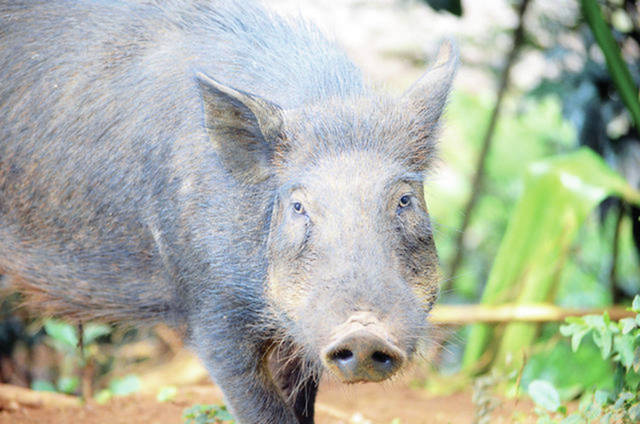LIHUE — New research out of the University of Hawaii supports the state’s work to eradicate invasive and prevalent feral pigs, but also shows ways in which watersheds can benefit from the animals.
UH announced the publishing of two studies Friday, both looking at bacteria and invertebrate colonies in soil from Volcanoes National Park and Pu‘u Maka‘ala Natural Area Reserve.
One study reported direct benefits to soil bacterial communities when feral pigs were removed from the area of study. The other reported a benefit to having the pigs in the ecosystem, showing earthworms and ground beetles were positively associated with sites rooted by feral pigs.
However, the pigs’ negative impacts outweigh the positives, according to the studies.
“The removal of feral pigs is key to managing Hawaii’s forests, given the critical roles that soil microfauna — minute animals, especially those invisible to the naked eye — and mesofauna — very small invertebrates such as mites, nematodes or centipedes — have on forest ecosystems,” UH said in a Friday release about the studies.
That first study, published in Nature Scientific Reports, shows an increased diversity in the bacterial community over time following the removal of pigs. UH explains this indicates feral pig removal increases soil bacterial redundancy, which likely promotes ecological resiliency of the soil.
The second study, published in Biological Invasions, shows earthworms and ground beetles were positively associated with the sites rooted by feral pigs.
Researchers said that follows the worm-farming hypothesis, which suggests that changes to the soil from pig rooting, such as increased mixing of soil organic matter and reduced bulk density, improves earthworm habitat. Their alternative truffle-worm hypothesis suggests feral pigs are capable of intentionally seeking out soils with more below-ground food.
And while there could be some benefits to having the pigs in ecosystems, there are too many in Hawaii and they’re populating quickly. The state Department of Land and Natural Resources doesn’t have an estimate of the number of pigs in the state, but the DLNR’s Division of Forestry and Wildlife estimates that 70 percent of the population has to be eradicated each year just to keep it from growing.
The state partners with community organizations and with individuals to help keep feral animals under control. Trapping and fencing are two ways those partnerships work to control the population.
While pigs are bad news for the ecosystem in Hawaii, they’re culturally important. Pig hunting is popular and part of life for many local families — both recreationally and subsistence hunting — and the state works with hunters to do eradication as well.
One example of that is the six-month trial hunt on Nounou Mountain, or Sleeping Giant. It’s a popular hiking trail and was opened up for bow hunting only by registered hunters. During a six-month period in 2018, DLNR issued permits to 37 hunters, recorded 57 hunter trips with a total of 13 pigs killed, six sow and seven boar.
At the close of the trial hunt, more hunters voiced interest in being part of an extended trial period.
•••
Jessica Else, environment reporter, can be reached at 245-0452 or jelse@thegardenisland.com.




Appreciate all the scientific research and information but how about just a little common sense? Perhaps the pig routing and chicken scratching may be good for the soil but all that loose soil and the excrement from those pigs and chickens all end up in the rivers and out to the ocean. Just as all the grass and brush clippings and other trash left out on the street by yard work and even by county and state workers ends up in the drains and all gets flushed out to our ocean during those rainstorms.
That chocolate brown water flowing in our rivers and out to our ocean… that’s Kauai, eroding away. Little by little. As it has for about 5 million years. It’s called “erosion”. That “erosion”, and all the contaminants and pollution is doing a lot more damage to our coral reefs and sea life than a couple of degrees increase in our ocean temperatures.
Here we go again, man dictating how mother nature feral pigs should live. Maybe we should lower the price of pork, have more Luau celebrations, eat more pork and export more pork to willing buyers.


More Spam and Pork bbqs less terrorists too!?